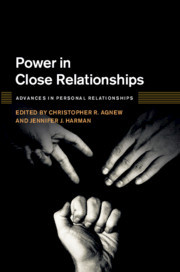Description
Power in Close Relationships
Advances in Personal Relationships Series
Coordinators: Agnew Christopher R., Harman Jennifer J.
An outline of how power, an inherent feature of social interactions, operates and affects close relationships.
Language: English
Subject for Power in Close Relationships:
Power in Close Relationships
Publication date: 10-2020
Support: Print on demand
Publication date: 10-2020
Support: Print on demand
Power in Close Relationships
Publication date: 02-2019
294 p. · 15.6x23.5 cm · Hardback
Publication date: 02-2019
294 p. · 15.6x23.5 cm · Hardback
Description
/li>Contents
/li>Biography
/li>
Power is an inherent feature of social interactions, yet it is hard to define and therefore understand. This book is the first to organize current interdisciplinary theorizing and research about power from leading academics in areas such as social psychology, communications, family studies, and public health. It also focuses exclusively on how power operates and affects close relationship processes, while the theoretical insights provided point the way toward new lines of research and understanding. Using specific examples to illustrate complex theoretical explanations and supplying thorough descriptions of the existing literature on power in close relationships, this book is an essential resource for researchers, professionals, students, or laypeople seeking to better understand how power operates in those relationships that are most important to us.
An evolutionary perspective on the role of status in close relationships Gillian A. Mccabe and Virgil Zeigler-Hill; 2. Attachment insecurity and the regulation of power and dependence in intimate relationships Emily J. Cross and Nickola C. Overall; 3. Interdependence perspectives on power in relationships Ximena B. Arriaga, Michael Ioerger and Laura E. Vanderdrift; 4. Leveraging power in intimate partner relationships: a power basis perspective I-Ching Lee, Felicia Pratto and Judy Y. Tan; 5. The dyadic power-social influence model: extensions and future directions Allison K. Farrell, Alexander J. Rothman and Jeffry A. Simpson; 6. The impact of multilevel sources of power on intimate relationship functioning Christopher R. Agnew, Jennifer J. Harman, Elizabeth Keneski and Andrew L. Stewart; 7. Power in families J. Kale Monk, Brian G. Ogolsky and Angela M. Whittaker; 8. When sex is power: gender roles in sex and their consequences Michelle R. Kaufman and Julie Pulerwitz; 9. Power in close intimate relationships Emily A. Impett, James J. Kim and Mariko L. Visserman; 10. Power and interpersonal violence; 11. Power and interpersonal communication Michael E. Roloff and Denise Haunani Solomon; 12. Interpersonal power and nonverbal communication Quinten Bernhold and Norah E. Dunbar.
Christopher R. Agnew is Professor of Psychological Sciences at Purdue University, Indiana, where he currently serves as Associate Vice President for Research. As a social psychologist, his research focuses on interpersonal relationships and using relational theories to understand broader social and health processes.
Jennifer J. Harman is Associate Professor of Psychology at Colorado State University. Her research has focused on perceptions and power in intimate relationships, most recently with how these concepts affect relationships and families after they have dissolved.
Jennifer J. Harman is Associate Professor of Psychology at Colorado State University. Her research has focused on perceptions and power in intimate relationships, most recently with how these concepts affect relationships and families after they have dissolved.
© 2024 LAVOISIER S.A.S.




